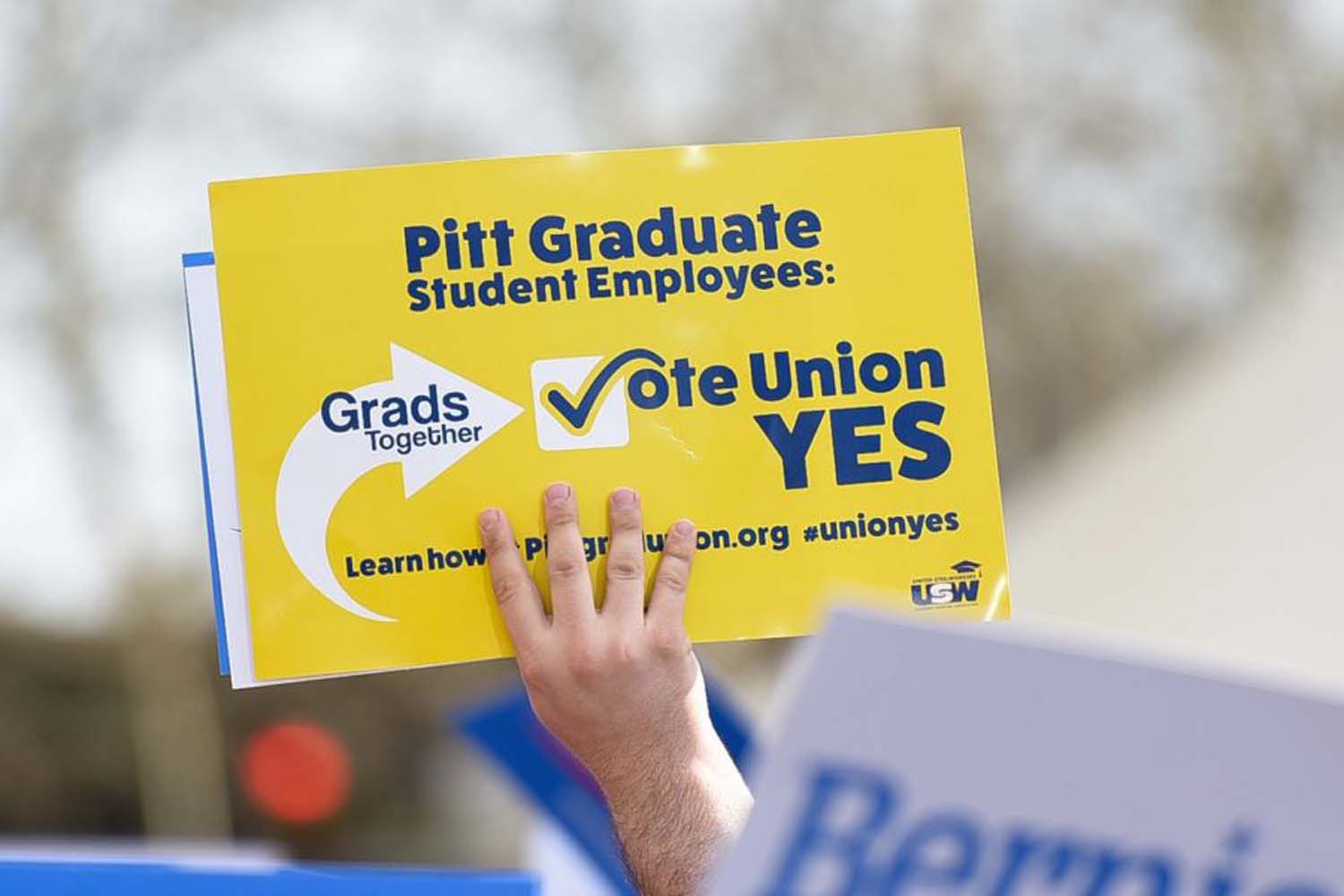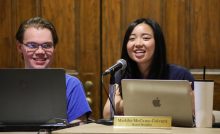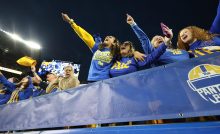Labor official: Pitt website, department chair email involved in unfair practices


The Pennsylvania Labor Relations Board filed a decision Wednesday ordering a new election for Pitt’s graduate student union.
The Pennsylvania Labor Relations Board declared on the morning of May 3 that Pitt’s graduate students had voted 712 to 675 against unionization. But even before the board made its final determination, graduate student union organizers had filed a complaint with the board alleging unfair labor practices from Pitt during the election.
Now it looks like organizers will get the second chance they’re looking for. PLRB Hearing Examiner Stephen Helmerich filed a decision Wednesday ordering a new union election. And unless the board files an exception to Helmerich’s ruling — it has 20 days to do so, in accordance with PLRB regulations — graduate students will soon vote again on the union question.
In the 30-page document, Helmerich addressed numerous allegations from union organizers that the University had unfairly influenced the election. While Helmerich said many of the organizers’ claims were not supported by evidence, he determined that several actions taken by the University did constitute “unfair practices.”
Because it’s possible that this set of “coercive acts” influenced enough students to change the outcome of the election, Helmerich said, a new election must be held.
As is standard practice in a PLRB election, union organizers and the University chose a set of poll watchers who observed the voting process. Throughout the four-day election, the ballot table was flanked by one union-selected poll watcher and one University-selected poll watcher.
Union organizers alleged that the four watchers chosen by the University — administrators Amy Tuttle, Peggy King, Amanda Brodish and Victoria Lancaster — should not have been accepted by the board since they were supervisors. Helmerich dismissed the claim, saying that none of the four administrators directly supervised any eligible voters.
The University’s election watchers also kept a record of the students that voted throughout the election. During the election, a United Steelworkers representative told Dennis Bachy, the board agent supervising the election, about the list.
The PLRB has no rule against parties keeping a list of voters. In fact, as Bachy told the representative, it’s quite common. But Helmerich ruled that the University’s use of the list — specifically, one email sent to eligible voters by a department chair — constituted unfair practices similar to surveillance.
On the morning of the third day of the election, graduate students in the chemical engineering department received an email from their department chair, Steven Little, indicating that Little knew how many engineering students had voted in the first two days of the election.
“I just wanted to send you a note encouraging you to vote in the graduate student unionization election,” Little wrote. “I was actually a little surprised to see that only 81 students in the School of Engineering (whole school) have voted so far.”
Helmerich said the email created the impression for eligible voters in Little’s department that “their votes were under close scrutiny and observation by the management of the University.”
“The problem is not that the University kept a list,” Helmerich wrote. “The unfair practice is what the University did with that information.”
In addition to Little’s email, Helmerich said, the University committed unfair practices by posting false information on its website. According to Helmerich, on Pitt’s union question-and-answer web page the University made an unsubstantiated claim that “[w]ith a union, the University is not permitted to discuss academic appointments directly with students.”
“Nothing in the record supports the University’s definitive conclusion that graduate students within the bargaining unit would be prohibited from speaking directly to University agents about academic appointments,” Helmerich wrote.
Helmerich’s last finding of unfair practices by the University involved another section of the question-and-answer page which listed “Collective Bargaining Basics.” The page contained “substantial departure from the truth,” Helmerich said.
A chart on the page told visitors that a union wouldn’t be able to bargain over things like admissions decisions, programmatic decisions and the number of academic appointments. But in a different section of the same chart, the page said a union would be able to bargain over “working conditions,” adding that the PLRB had never defined the limitations of the term for graduate students.
Helmerich called the chart “contradictory” and “paradoxical,” noting that if “working conditions” was an undefined term, the University couldn’t claim that it didn’t apply to admissions decisions or academic appointments.
Pitt spokesperson Kevin Zwick rejected the idea that the University committed misconduct during the election.
“In the strongest possible terms, the University disagrees with any suggestion that we acted inappropriately in the election where Pitt graduate students voted not to be represented by the United Steelworkers,” Zwick said. “We will review this proposed ruling and consider next steps.”
The Twitter account for the graduate studies program, @PittGradStudies, posted a similar statement Wednesday evening.
“Pitt acted appropriately throughout the election — where graduate students voted not to be represented by USW — and we strongly disagree with any suggestion to the contrary,” the account wrote.
Recent Posts
SGB introduces new governing code bill and addresses rumors of ICE on campus
At its weekly meeting at Nordy’s Place on Tuesday, Student Government Board introduced an omnibus…
Opinion | School should be in the summer
Although this may be controversial, I believe that from this data, it is evident that…
Weathering the storm: Pittsburgh teams have tackled some of the toughest environments
The end of the year in western Pennsylvania is always marked by two things —…
Notes From an Average Girl // Notes on Book Banning
In this edition of Notes From an Average Girl, senior staff writer Madeline Milchman writes…
To Be Honest // Yup, it is that damn phone
In this edition of To Be Honest, staff writer Evin Verbrugge writes about her phone…
Meaning at the Movies | Portraying Toxic ‘Adolescence’
In this edition of Meaning at the Movies, staff writer Lauren Deaton explores the mini-series…

